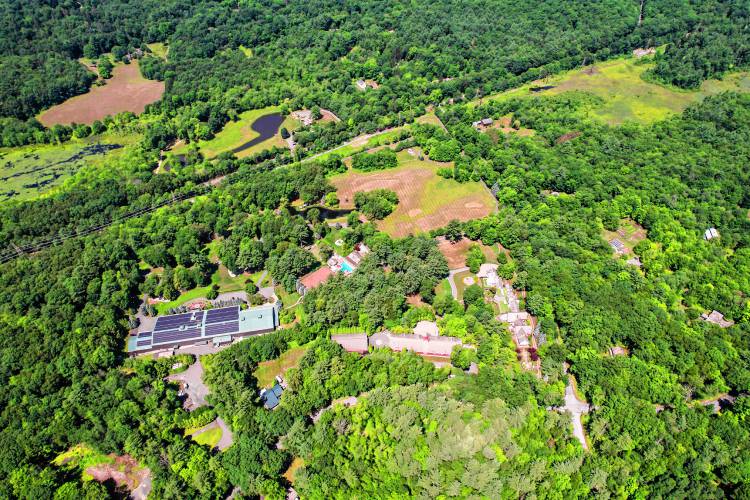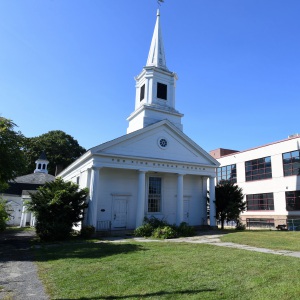Leverett residents rap Kittredge compound plans, urge caution as negotiations for 400 homes move forward

The sprawling Leverett estate built by late Yankee Candle Co. founder Michael J. Kittredge II. The site is bounded by Amherst Road to the east, railroad tracks to the west, and Juggler Meadow Road to the north, and extends into Amherst to the south. SURETTE MEDIA GROUP
| Published: 12-10-2024 4:03 PM |
LEVERETT — Leverett residents are asking town officials to be skeptical of plans for turning the sprawling, 60-acre estate of Yankee Candle founder Michael J. Kittredge II into a 400-home development reserved for people 55-and-over, even if a portion of the dwellings are set aside for low- and moderate-income individuals.
“Definitely people in town would love to see affordable housing, and more housing in general,” said Nancy Grossman, vice chairwoman of the Leverett Finance Committee. “But the bigger issue is one of trust, and a perception that Kittredge has always been a negative influence on town.”
For Carol Heim, whose Amherst Road home sits across from the compound that was developed by absorbing numerous residential properties beginning in the 1990s, there have been no market studies indicating a demand for such housing, and whether such a project is financially viable.
“I haven’t seen anything establishing that kind of demand,” Heim said in an interview, adding that it’s unclear if the plans, as shown by Josh Wallack, the development manager working on behalf of Kittredge’s son, Mick Kittredge, are realistic. “He’s presenting this as a project for downsizing, but it’s not clear to me that this can happen.”
Both Grossman and Heim were on hand for a listening session following a November special Town Meeting that packed the Leverett Elementary School gymnasium with more than 100 residents, as was the case at Wallack’s first presentation on the development in December 2023.
The concern for residents is whether Leverett will move forward with a Local Initiative Project under the state’s Chapter 40B affordable housing law, which would give the town more control and lead to a “friendly” process, as opposed to a “hostile” process. Because the town doesn’t meet the state’s 10% requirement of affordable housing under the subsidized housing inventory, such a project, with some affordable homes, could be exempted from the town’s various zoning rules.
Select Board member Jed Proujnaky has been among those at the forefront of conversations about what should happen at the property if no buyer is found for the estate which has been on the market for $23 million for more than two years.
“The town is not opposed to low-income housing and senior housing, and considers that desirable,” Proujansky said. “I’m not sure that in the long run, though, there will be a viable place where the town and developer will come into alignment.”
Article continues after...
Yesterday's Most Read Articles
The plans currently call for 48 affordable homes in Leverett, the maximum that could be built based on affordable rules that limit to 6% of the existing housing stock in town, with the remaining 352 homes in Amherst.
Wallack said in an interview that he is waiting for a project eligibility letter from the Department of Housing and Community Development. Once this is in hand, the local process would be initiated with the town’s Zoning Board of Appeals, likely within 50 to 90 days of receiving the letter.
He wants to get buy-in from both Leverett and Amherst officials, as well as Leverett residents.
“Everyone has an opinion, and we want to hear from everybody,” Wallack said. “We have an open mind and open ears to both stakeholders in Leverett and Amherst.”
Already, using the feedback at the first presentation a year ago, plans have been scaled back, reducing overall density and pushing more into Amherst, as well as limiting the homes to those 55-and-over to reduce the school-age children who might populate the local schools.
“We’ve kept an open mind and an open heart,” Wallack said. “The project is now less than half of the density that had been proposed.”
Wallack is also promoting the development as a place for people to downsize and open up existing housing stock for young families, especially in Amherst.
“At the end of the day, we’d like to build these homes, which will free up and ease some of the region’s supply crunch,” Wallack said.
Many residents are observing the proposals closely.
Phil Carter, a member of the Finance Committee who lives on Amherst Road across from the estate, has advised the Select Board against making it a Local Initative Project and undertaking any negotiations as just three residents who would be making decisions for the entire town.
“The thing most worrying is the Select Board negotiating with Josh Wallack and coming up with a Local Initiative Project,” Carter said.
He also questions whether it’s even doable.
“It seems impossible to me,” Carter said. “It’s a long way from the nearest water and sewer lines, it’s not near any stores. It seems it’s not a good place to put a dense development like that.”
Heim characterizes much of what has been presented to townspeople and officials so far as misinformation and incomplete information. But Heim said she, like many in Leverett, support the development of affordable housing.
The mistrust for Grossman comes from hearing before the state’s Tax Appellate Board in 2019 that successfully reduced the Kittredge estate assessment from $9.9 million to $6.5 million in both fiscal years 2014 and 2015, meaning that the town both years lost out on more than $67,000, money that had to be paid from other property owners, or by cuts in town and school operations.
Jacob Park, a Planning Board member and Juggler Meadow Road resident near the estate, said Wallack has no track record of developing affordable housing.
“At both meetings, there was overwhelming opposition to Josh Wallack and his vision for the property,” Park said.
Some of the skepticism focuses on Wallack saying that $1.5 million to $2 million is needed each year to maintain the existing estate’s amenities, including an indoor water park, a bowling alley and tennis courts and a video arcade. Even if 400 total housing units are built, that would mean up to $5,000 a year for each one in association fees for the amenities. “It seems like a dubious model from a business perspective,” Park said.
“It’s hard to see how the finances work out,” Grossman said.
Heim said there are questions about whether those in the affordable homes would be denied access to the on-site amenities if they had lower association fees.
Proujansky said the Select Board would have concerns about unloading the costs of maintenance onto tenants.
Park said that Wallack undertook two rollercoaster and associated projects in Orlando, Florida and in Atlantic City, New Jersey that never got off the ground
“There is a lot of very significant red flags about his track record and business model,” Park said.
“He has no record of doing this kind of development,” Heim said.
One of Wallack’s successes was a 14-story, mixed-use parking garage in Orlando, but the scale of the Kittredge redevelopment would dwarf that.
Any development will likely depend on whether Amherst officials are willing to provide the water and sewer such a large project would need. Wallack has admitted as much.
“It all comes down to what Amherst wants to do,” Park said.
But he noted Amherst’s master plan, as a guiding document, strongly encourages in-fill development in already developed areas, with the bulk of new housing and commercial for downtown and village centers.
Amherst Town Manager Paul Bockelman said the hope is to have a meeting with Leverett officials at some point in the near future. Previously, Bockelman said any extension of sewer and water lines would only come at the appeal of Leverett officials, much as Amherst extended the town’s water to Teawaddle Hill Road in East Leverett to help residents with water contaminated by a capped landfill.
The impact on roads and infrastructure also is unknown. Proojansky said that access to the estate includes using a narrow and low bridge on Juggler Meadow Road, a gravel road on Teawaddle Hill and a two-lane paved Amherst Road, though that has no shoulders.
Wallack said while he has been based in Florida, he is familiar with the region and his parents have lived in the Berkshires.
With the state’s housing department, he believes that the favorable project eligibility letter will come and that more defined plans can be presented.
“In the end of the day, they’re mandated to get housing,” Wallack said.
He is already working with experts on 40B. SEB Housing of Needham is the 40B consultant.
“We’re here to build a project that everybody can be proud of and which will bring a lot of tax revenue,” Wallack said.






 ‘It’s a Wonderful Night in Turners Falls’ showcases village businesses, nonprofits
‘It’s a Wonderful Night in Turners Falls’ showcases village businesses, nonprofits Sackrey Construction Co. of Sunderland celebrating 35 years in business
Sackrey Construction Co. of Sunderland celebrating 35 years in business Photo: As darkness falls
Photo: As darkness falls Greenfield Historical Commission to hold demolition delay hearing for Zion Church
Greenfield Historical Commission to hold demolition delay hearing for Zion Church
